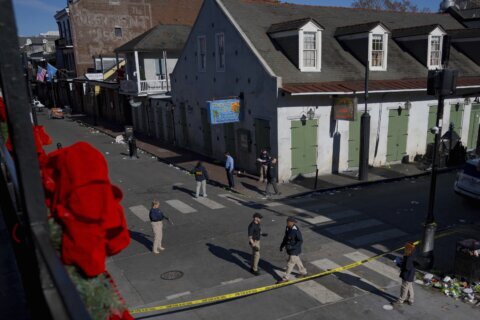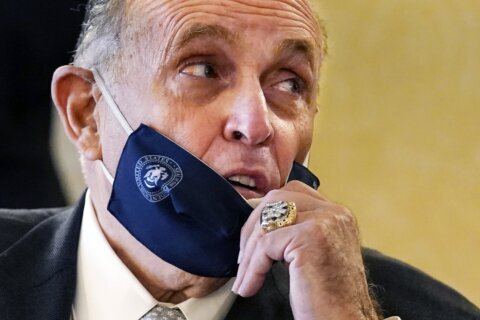Hughes Van Ellis, who was the youngest known survivor of the Tulsa Race Massacre and who spent his latter years pursuing justice for his family and other descendants of the attack on “Black Wall Street,” has died. He was 102.
The World War II veteran and published author who was affectionately called “Uncle Redd” by his family and community died Monday while in hospice in Denver, said his family’s publicist, Mocha Ochoa.
After the war, Van Ellis worked as a sharecropper and went on to raise seven children, all in the shadow of the Tulsa massacre in 1921, when a white mob laid waste to the city’s once-thriving Black community.
“I’ll remember each time that Uncle Redd’s passionate voice reached hearts and minds in courtrooms, halls of Congress, and interviews,” said Damario Solomon-Simmons, one of the attorneys who has pursued compensation for the survivors of the Tulsa Race Massacre.
“He was much more than a client,” Solomon-Simmons said in a statement Tuesday. “He was a partner in the quest for justice and reparations. He was a source of inspiration and strength during times of doubt and despair.”
Van Ellis was just 6 months old when he and his family escaped what is widely considered one of the most stark examples of racial violence in American history.
Tensions between Tulsa’s Black and white residents inflamed when, on May 31, 1921, the white-owned Tulsa Tribune published a sensationalized report of an alleged assault by a 19-year-old Black shoeshine on a 17-year-old white girl working as an elevator operator.
With the shoeshine under arrest, a Black militia gathered at a local jail to prevent a lynch mob from kidnapping and murdering him. Then, a separate violent clash between Black and white residents sparked an all-out war.
Over 18 hours straddling May 31 and June 1, the white mob carried out a scorched-earth campaign against Greenwood. The death toll has been estimated to be as high as 300. More than 35 city blocks were leveled, an estimated 191 businesses were destroyed, and roughly 10,000 Black residents were displaced.
Although residents rebuilt Greenwood — the predominantly African American neighborhood known as Black Wall Street — urban renewal and a highway project pushed Black Tulsans out of the area.
While in New York in June to publicize a memoir co-written by his older sister, 109-year-old Viola Ford Fletcher, and grandnephew Ike Howard, Van Ellis told The Associated Press that he wanted the world to know what Black Tulsans were deprived of due to the massacre.
“I want the people to know really what happened,” he said. ”And then, I want something back for that.”
Van Ellis, whose words from his 2021 testimony to Congress serve as the foreword to Fletcher’s memoir “Don’t Let Them Bury My Story,” said he believed justice was possible in his lifetime.
“We’re getting pretty close (to justice), but we aren’t close enough,” he said. “We’ve got a lot more work to do. I have to keep on battling. I’m fighting for myself and my people.”
With Van Ellis’ death, only two Tulsa Race Massacre survivors remain — Fletcher and 108-year-old Lessie Benningfield Randle. In August, Oklahoma’s high court agreed to consider the survivors’ reparations lawsuit, after a lower court judge dismissed the case in July.
Ochoa, the family publicist, said Van Ellis is survived by a large family, including daughters Mallee and Muriel Van Ellis, who were his two primary caregivers in Denver.
But tributes to him also came from elected officials in Oklahoma. State Rep. Monroe Nichols, of Tulsa, called him “a giant” whose name will continue to be known by generations of Tulsans.
“He leaves a legacy of patriotism and the unending pursuit of justice,” said Nichols, who is also chair of Oklahoma Legislative Black Caucus.
___
Find more AP coverage of the Tulsa Race Massacre: https://apnews.com/hub/tulsa-race-massacre
Copyright © 2025 The Associated Press. All rights reserved. This material may not be published, broadcast, written or redistributed.







